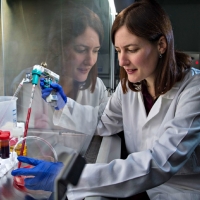Keele Biologist wins £1.4m ERC Research Grant to study Malaria

Dr Catherine Merrick, Senior Lecturer in Biology at Keele’s Centre for Applied Entomology and Parasitology (CAEP), has won a £1.4m European Research Council (ERC) Consolidator grant in this year's round of awards from the prestigious EU funding scheme.
Only around 100 such grants are awarded to biologists across the EU each year, targeting world-leading mid-career researchers. ERC grants are designed to support long-term, high-risk/high-gain research proposals and this award will allow Dr Merrick to bring three new researchers to CAEP for a five-year period: a substantial investment that is three to four times the size of a standard UK research council grant. It comes shortly after the award of another £480,000 grant from the UK Medical Research Council, to the same lab - collectively adding five new researchers to the CAEP community and significantly boosting malaria research at Keele.
In her ERC-funded project, Dr Merrick will use a novel technique that she recently developed at Keele to follow DNA replication and cell-cycle dynamics in the growth cycles of the human malaria parasite. This will reveal new insights into the fundamental biology of a very unusual parasitic microbe, and could also help scientists to understand important clinical aspects of malaria, such as antimalarial drug resistance and why the parasite grows differently in different human hosts.
Dr Merrick commented: “This work promises to transform our understanding of the basic biology of the malaria parasite, and of how that biology affects virulence. Remarkably little is known about the cell cycle of this highly important parasite, despite a wealth of knowledge on the subject in model cells.
“The malaria parasite is an early-diverging single-celled organism with a complex lifecycle and many unusual features: for example, it replicates in its human host by ‘schizogony’ instead of binary fission. This means that instead of duplicating its genome and splitting into two, a single parasite generates many new cells via independent, asynchronous rounds of genome replication before bursting out of its host cell and infecting new cells.
“This project will reveal, with unprecedented resolution, how DNA replication is organised in the parasite and how changing conditions in the human host and exposure to antimalarial drugs affect it.”
Professor David Amigoni, Pro Vice-Chancellor of Research and Enterprise at Keele University, commented: “This is a very prestigious award and a highly important project, which could shape global understanding of the clinical aspects of malaria, so I’m delighted that Dr Merrick and her new team will be able to further develop their innovative research here at Keele, where we have been leading study into entomology and parasitology for 25 years”.

